Former Trump-Russia special counsel Robert Mueller finally faces congressional interrogators on Wednesday, testifying in televised hearings that Democrats hope will weaken President Donald Trump's reelection prospects in ways that Mueller's book-length report did not. Republicans are ready to defend Trump and turn their fire on Mueller and his team instead.
Back-to-back Capitol Hill appearances, Mueller's first since wrapping his two-year Russia probe last spring, carry the extraordinary spectacle of a prosecutor discussing in public a criminal investigation he conducted into a sitting U.S. president.
Mueller, known for his taciturn nature, has warned that he will not stray beyond what's already been revealed in his report. And the Justice Department has instructed him to stay strictly within those parameters — giving Mueller a formal directive to point to if he faces questions he does not want to answer.
On Tuesday, Democrats on the House judiciary and intelligence committees granted his request to have his top aide in the investigation, Aaron Zebley, sit at the table with him. Zebley is not expected to be sworn in for questioning by the judiciary panel. But he will be able to answer questions before the intelligence committee, where, a committee aide said, he will be sworn in. The aide was not authorized to discuss the hearing preparations publicly and requested anonymity.
Trump complained Tuesday night about Zebley's presence, calling him a "Never Trumper" and tweeting: "What a disgrace to our system. Never heard of this before. VERY UNFAIR, SHOULD NOT BE ALLOWED."
Mueller's approach to testifying may well deny Democrats the made-by-TV moments they want to rally their base. But Republicans, too, are likely to be left without their sought-after confirmation that the Russia investigation was a politically tainted waste of time.
Trump this week feigned indifference to Mueller's testimony, telling reporters in the Oval Office on Monday, "I'm not going to be watching — probably — maybe I'll see a little bit of it."
The president has a light schedule when Mueller begins speaking Wednesday morning, then heads to West Virginia for evening fundraisers. The TVs aboard Air Force One are likely to be tuned to coverage of the hearings, and the president is expected to watch or be briefed on most of the proceedings, according to four administration officials and Republicans close to the White House. They spoke on condition of anonymity because they were not authorized to discuss internal plans.
Yet the former special counsel need not say much to have his own quiet impact: His mere appearance will give voice to the 448-page legal thicket known as the Mueller report. His testimony — however sparse — will convert from dense paragraphs into plain English a document many in America have yet to wade through.
Mueller may create a powerful impression simply by confirming without hesitation some damning details from his report. A former FBI director who spent 12 years parrying questions from lawmakers at oversight hearings, and decades before that as a prosecutor who asked questions of his own, Mueller is unlikely to be goaded into saying anything he doesn't want to say.
In fact, he had to be subpoenaed to show up in the first place.
Wednesday's first hearing before the Judiciary Committee will focus on whether the president illegally obstructed justice by attempting to seize control of Mueller's investigation.
The special counsel examined nearly a dozen episodes, including Trump's firing of FBI Director James Comey and his efforts to have Mueller himself removed. Mueller in his report ultimately declined to state whether the president broke the law, saying such a judgment would be unfair in light of Justice Department legal opinions that bar the indictment of a sitting president.
The afternoon hearing before the House intelligence committee will dive into ties between the Trump campaign and the Kremlin.
On that question, Mueller's report documented a trail of contacts between Russians and Trump associates — including a Trump Tower meeting at which the president's eldest son expected to receive dirt on Democrat Hillary Clinton — but the special counsel found insufficient evidence of a criminal conspiracy aiming to tip the 2016 election.
Like most Russia-related hearings before Congress, this one is likely to divide sharply along partisan lines.
Democrats are angling to draw Mueller out on some of the most incendiary findings of the report, including Trump's repeated attempts to choke off the investigation.
Even if the testimony won't inspire impeachment demands — House Speaker Nancy Pelosi has made clear she will not pursue impeachment, for now — Democrats hope Mueller can unambiguously spell out questionable, norm-shattering actions by the president.
Republicans, by contrast, are likely to confront Mueller on the origins of the FBI's Russia probe and whether opposition to the Trump campaign drove the early days of the investigation.
They'll ask about a dossier of opposition research compiled by a former British spy that was funded by Democrats and cited by the Justice Department in its application for a secret surveillance warrant on a former Trump campaign associate.
They'll also press Mueller on Peter Strzok, the former FBI counterintelligence agent who badmouthed Trump over text message even as he was helping lead an investigation into the campaign. Mueller fired him once the texts were discovered two years ago, but Strzok has remained a talking point for Trump in trying to discredit Mueller's work.
Mueller is also likely to be asked about his own tensions with Attorney General William Barr over how the report was handled and how its findings were communicated to the public.
Mueller complained privately to Barr in March that the attorney general's four-page letter summarizing the main findings of his report "did not fully capture the context, nature and substance of this office's work and conclusions." Barr, in turn, has called Mueller's note "a bit snitty."
Mueller has made clear he didn't think it was appropriate to make a determination one way or the other about whether the president had committed a crime. He has rejected Barr's assessment that the evidence couldn't satisfy an obstruction of justice allegation, noting both in his report — and, again, in a public statement from the Justice Department podium — that if he had confidence the president had not committed a crime, he would have said so.
Barr had no such hesitation and has said Mueller shouldn't have started investigating the president if he wasn't prepared to reach a conclusion.
Associated Press writer Jonathan Lemire in New York contributed to this report.
UNITED NATIONS (AP) — The United States vetoed a widely backed U.N. resolution Thursday that would have paved the way for full United Nations membership for Palestine, a goal the Palestinians have long sought and Israel has worked to prevent.
The vote in the 15-member Security Council was 12 in favor, the United States opposed and two abstentions, from the United Kingdom and Switzerland. U.S. allies France, Japan and South Korea supported the resolution.
The strong support the Palestinians received reflects not only the growing number of countries recognizing their statehood but almost certainly the global support for Palestinians facing a humanitarian crisis caused by the war in Gaza, now in its seventh month.
The resolution would have recommended that the 193-member U.N. General Assembly, where there are no vetoes, approve Palestine becoming the 194th member of the United Nations. Some 140 countries have already recognized Palestine, so its admission would have been approved, likely by a much higher number of countries.
U.S. deputy ambassador Robert Wood told the Security Council that the veto “does not reflect opposition to Palestinian statehood but instead is an acknowledgment that it will only come from direct negotiations between the parties."
The United States has “been very clear consistently that premature actions in New York — even with the best intentions — will not achieve statehood for the Palestinian people,” deputy State Department spokesman Vedant Patel said.
His voice breaking at times, Palestinian U.N. Ambassador Riyad Mansour told the council after the vote: “The fact that this resolution did not pass will not break our will and it will not defeat our determination.”
“We will not stop in our effort,” he said. “The state of Palestine is inevitable. It is real. Perhaps they see it as far away, but we see it as near.”
This is the second Palestinian attempt for full membership and comes as the war in Gaza has put the more than 75-year-old Israeli-Palestinian conflict at center stage.
Palestinian President Mahmoud Abbas first delivered the Palestinian Authority’s application for U.N. membership in 2011. It failed because the Palestinians didn’t get the required minimum support of nine of the Security Council’s 15 members.
They went to the General Assembly and succeeded by more than a two-thirds majority in having their status raised from a U.N. observer to a non-member observer state in 2012. That opened the door for the Palestinian territories to join U.N. and other international organizations, including the International Criminal Court.
Algerian U.N. Ambassador Amar Bendjama, the Arab representative on the council who introduced the resolution, called Palestine’s admission “a critical step toward rectifying a longstanding injustice" and said that “peace will come from Palestine’s inclusion, not from its exclusion.”
In explaining the U.S. veto, Wood said there are “unresolved questions” on whether Palestine meets the criteria to be considered a state. He pointed to Hamas still exerting power and influence in the Gaza Strip, which is a key part of the state envisioned by the Palestinians.
Wood stressed that the U.S. commitment to a two-state solution, where Israel and Palestine live side-by-side in peace, is the only path for security for both sides and for Israel to establish relations with all its Arab neighbors, including Saudi Arabia.
“The United States is committed to intensifying its engagement with the Palestinians and the rest of the region, not only to address the current crisis in Gaza, but to advance a political settlement that will create a path to Palestinian statehood and membership in the United Nations,” he said.
Mansour, the Palestinian U.N. ambassador, reiterated the commitment to a two-state solution but asserted that Israel believes Palestine "is a permanent strategic threat."
"Israel will do its best to block the sovereignty of a Palestinian state and to make sure that the Palestinian people are exiled away from their homeland or remain under its occupation forever,” he said.
He demanded of the council and diplomats crowded in the chamber: “What will the international community do? What will you do?”
Israeli-Palestinian negotiations have been stalled for years, and Israel’s right-wing government is dominated by hard-liners who oppose Palestinian statehood.
Israeli U.N. Ambassador Gilad Erdan called the resolution “disconnected to the reality on the ground” and warned that it “will cause only destruction for years to come and harm any chance for future dialogue.”
Six months after the Oct. 7 attack by the Hamas militant group, which controlled Gaza, and the killing of 1,200 people in “the most brutal massacre of Jews since the Holocaust,” he accused the Security Council of seeking “to reward the perpetrators of these atrocities with statehood.”
Israel’s military offensive in response has killed over 32,000 Palestinians, according to Gaza’s health ministry, and destroyed much of the territory, which speaker after speaker denounced Thursday.
After the vote, Erdan thanked the United States and particularly President Joe Biden “for standing up for truth and morality in the face of hypocrisy and politics.”
He called the Palestinian Authority — which controls the West Bank and the U.S. wants to see take over Gaza where Hamas still has sway — “a terror supporting entity.”
The Israeli U.N. ambassador referred to the requirements for U.N. membership – accepting the obligations in the U.N. Charter and being a “peace-loving” state.
“How can you say seriously that the Palestinians are peace loving? How?” Erdan asked. “The Palestinians are paying terrorists, paying them to slaughter us. None of their leaders condemns terrorism, nor the Oct. 7 massacre. They call Hamas their brothers.”
Despite the Palestinian failure to meet the criteria for U.N. membership, Erdan said most council members supported it.
“It’s very sad because your vote will only embolden Palestinian rejectionism every more and make peace almost impossible,” he said.
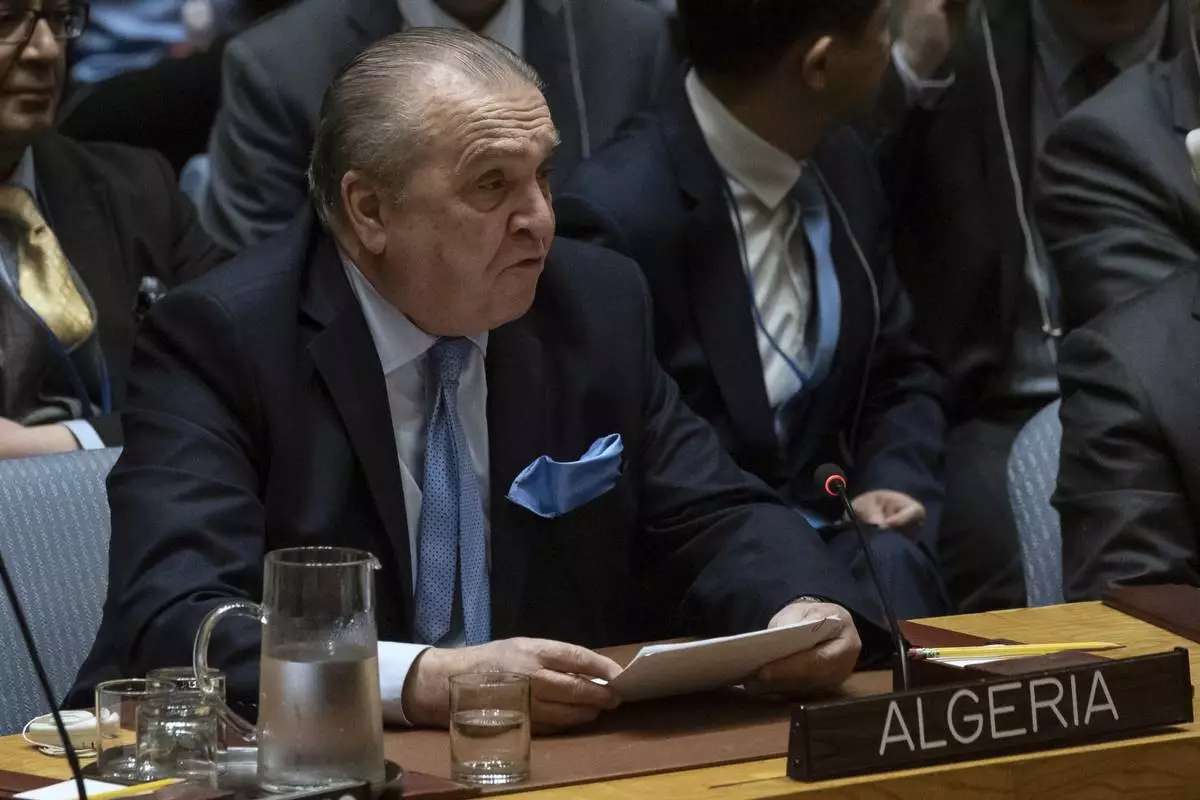
Algeria's Permanent Ambassador to the United Nations Amar Bendjama speaks during a Security Council meeting at United Nations headquarters, Thursday, April 18, 2024. (AP Photo/Yuki Iwamura)
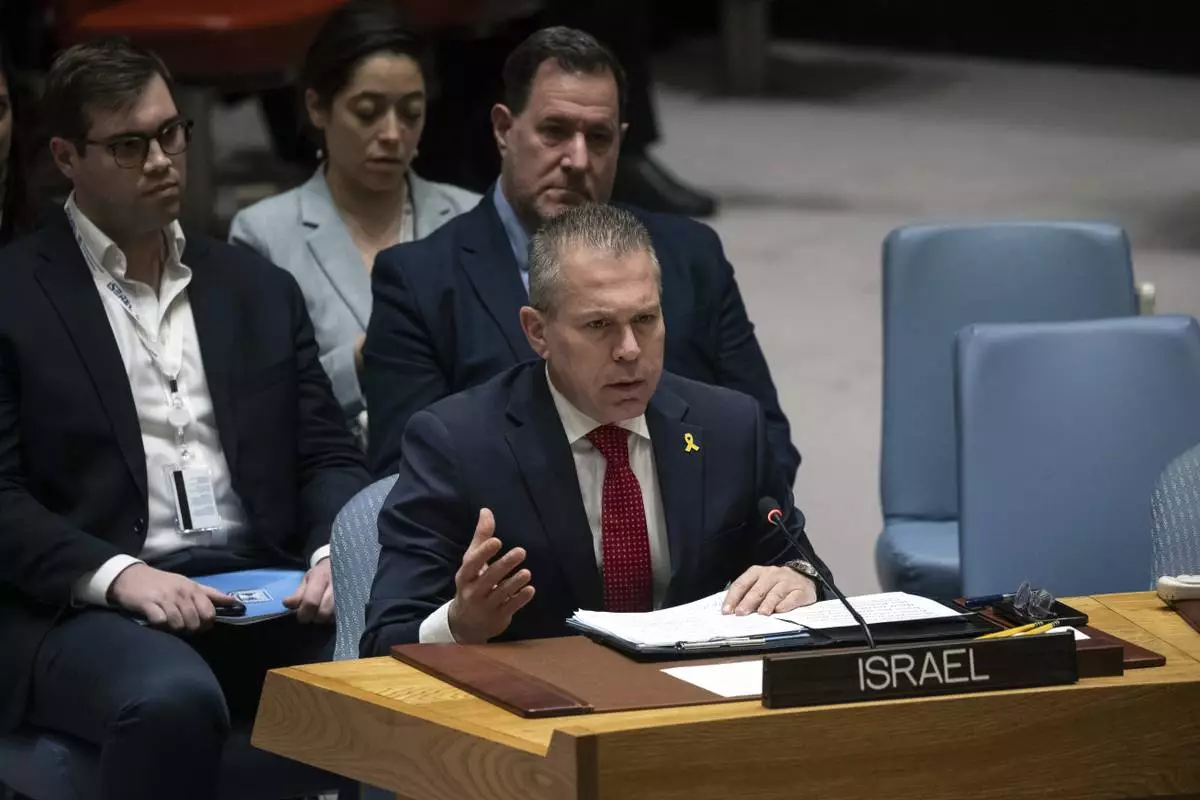
Israeli Ambassador to the United Nations Gilad Erdan speaks during a Security Council meeting at United Nations headquarters, Thursday, April 18, 2024. (AP Photo/Yuki Iwamura)
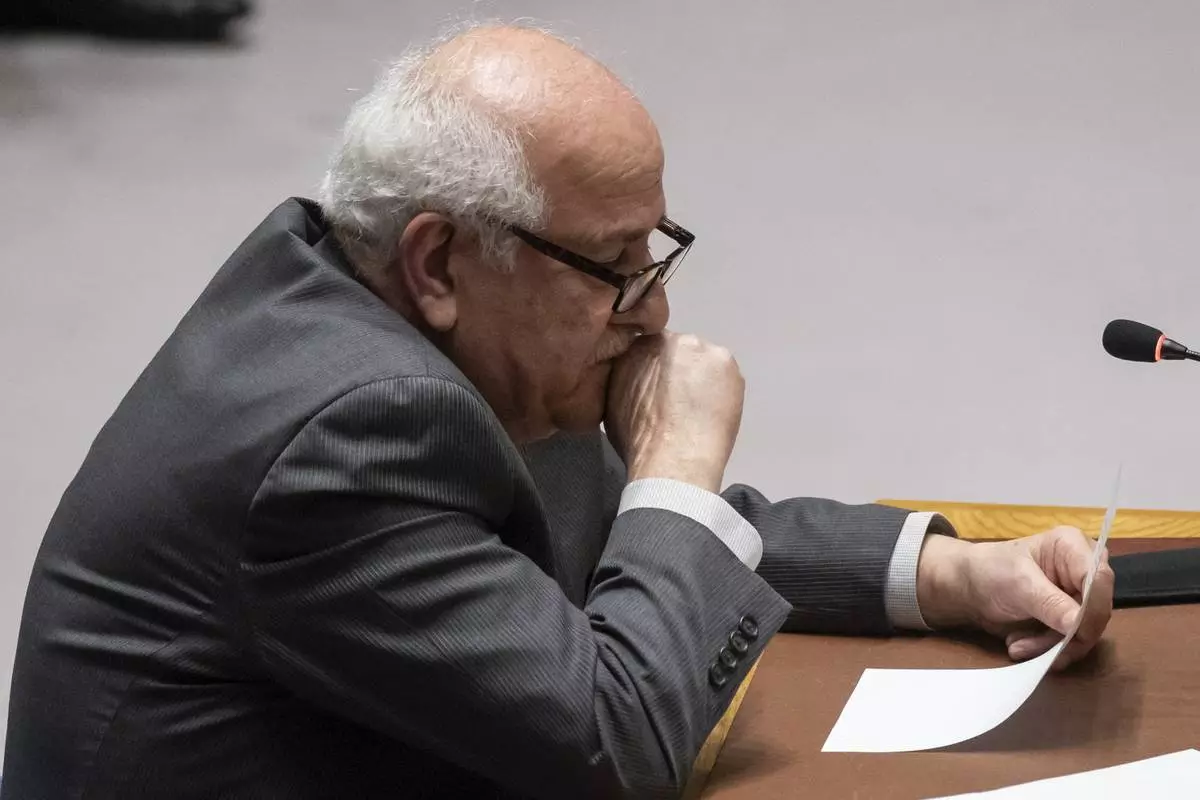
Palestinian Ambassador to the United Nations Riyad Mansour holds tears while speaking during a Security Council meeting at United Nations headquarters, Thursday, April 18, 2024. (AP Photo/Yuki Iwamura)
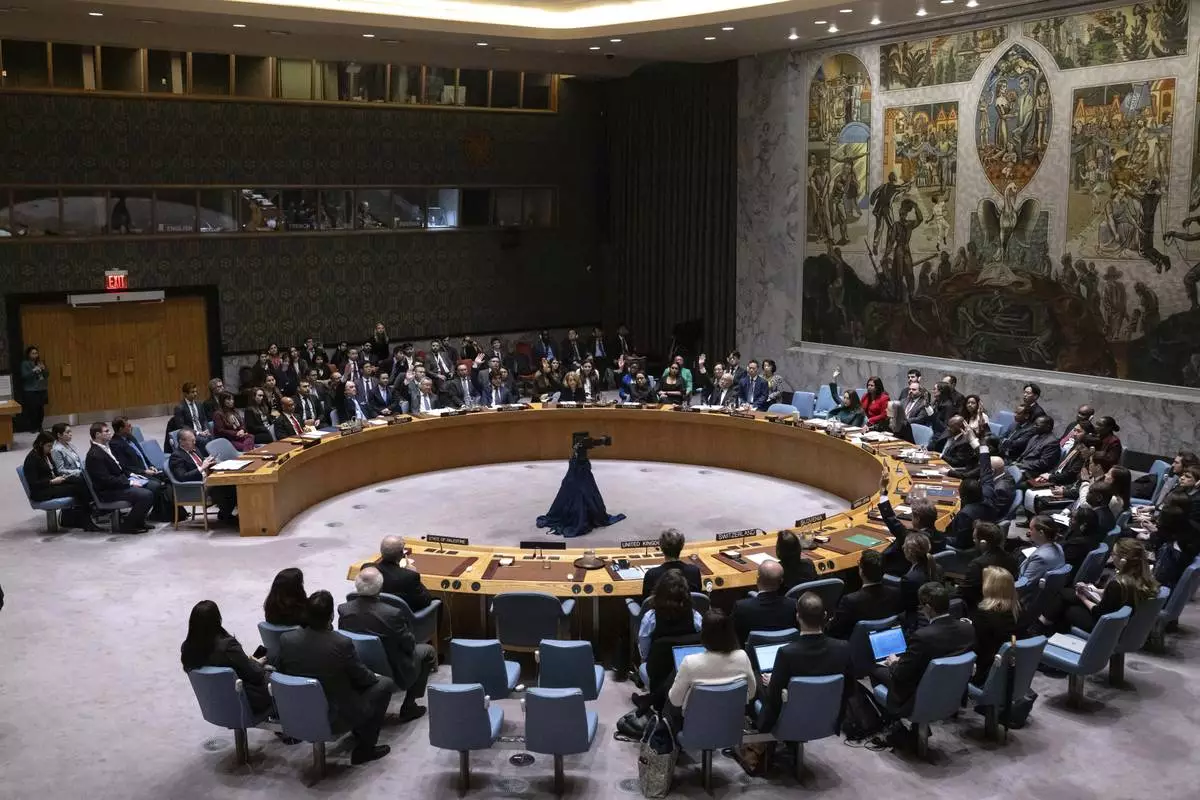
Representatives of member countries take votes during a Security Council meeting at United Nations headquarters, Thursday, April 18, 2024. (AP Photo/Yuki Iwamura)
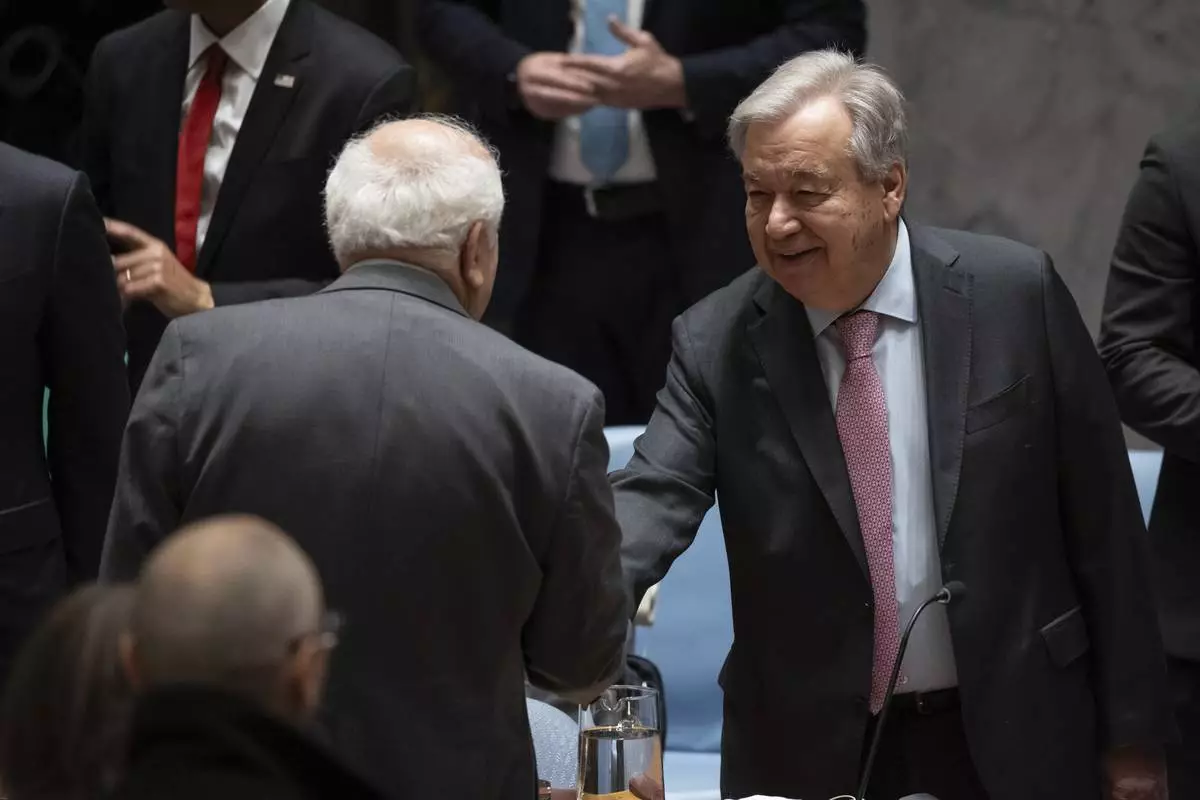
Palestinian Ambassador to the United Nations Riyad Mansour, left, and United Nations Secretary-General Antonio Guterres speak before a Security Council meeting at the United Nations headquarters, Thursday, April 18, 2024. (AP Photo/Yuki Iwamura)
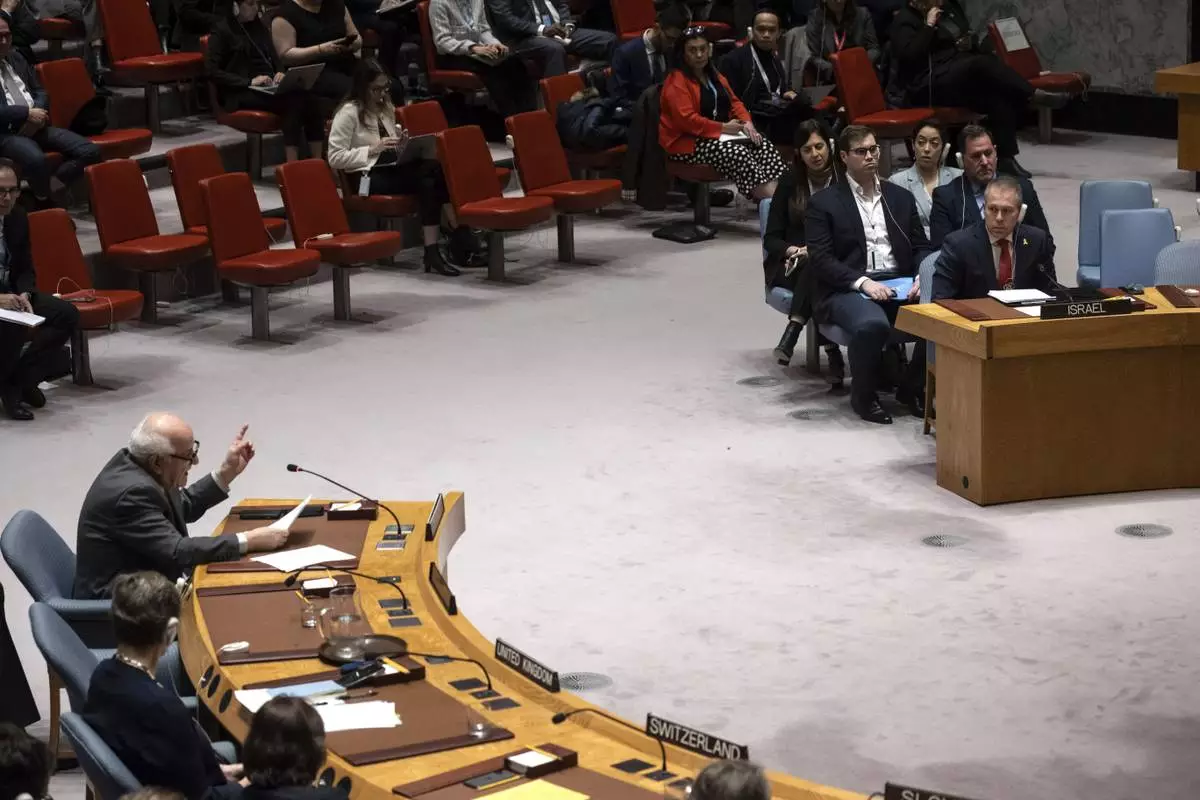
Palestinian Ambassador to the United Nations Riyad Mansour speaks during a Security Council meeting at United Nations headquarters, Thursday, April 18, 2024. (AP Photo/Yuki Iwamura)
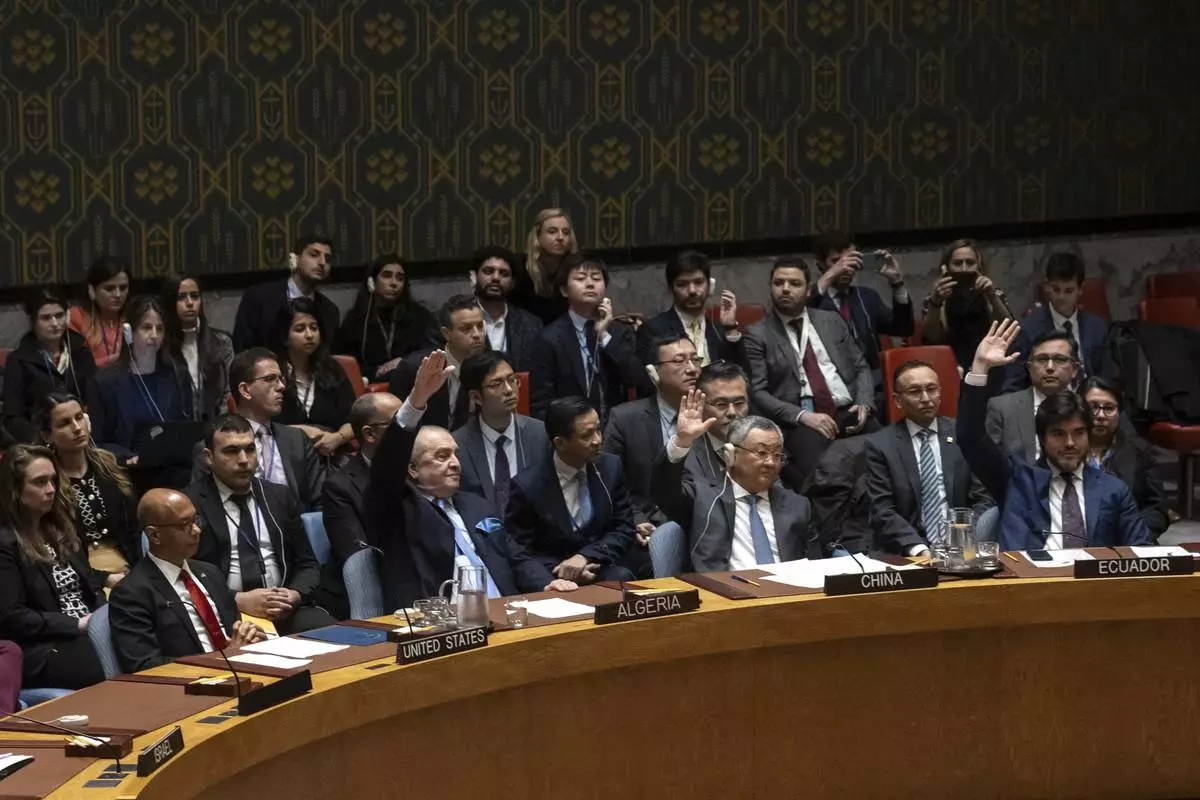
Representatives of member countries take votes during a Security Council meeting at United Nations headquarters, Thursday, April 18, 2024. (AP Photo/Yuki Iwamura)
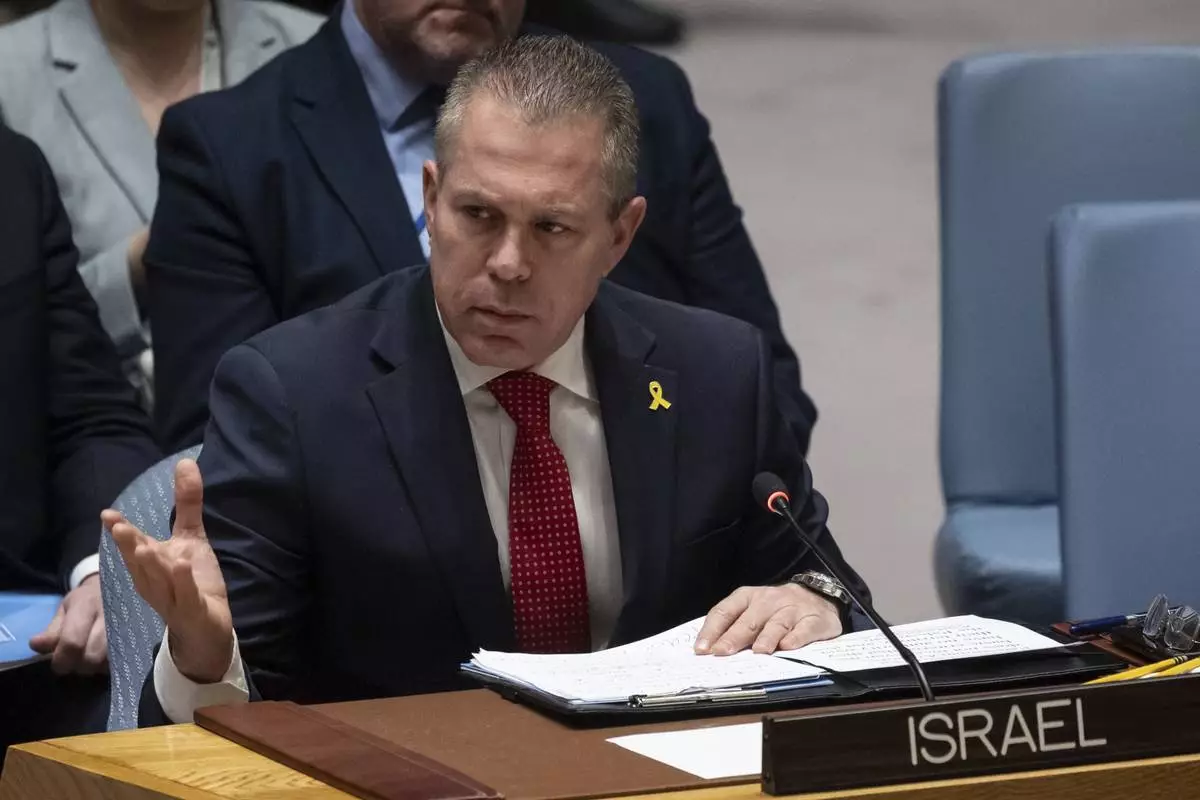
Israeli Ambassador to the United Nations Gilad Erdan speaks during a Security Council meeting at United Nations headquarters, Thursday, April 18, 2024. (AP Photo/Yuki Iwamura)
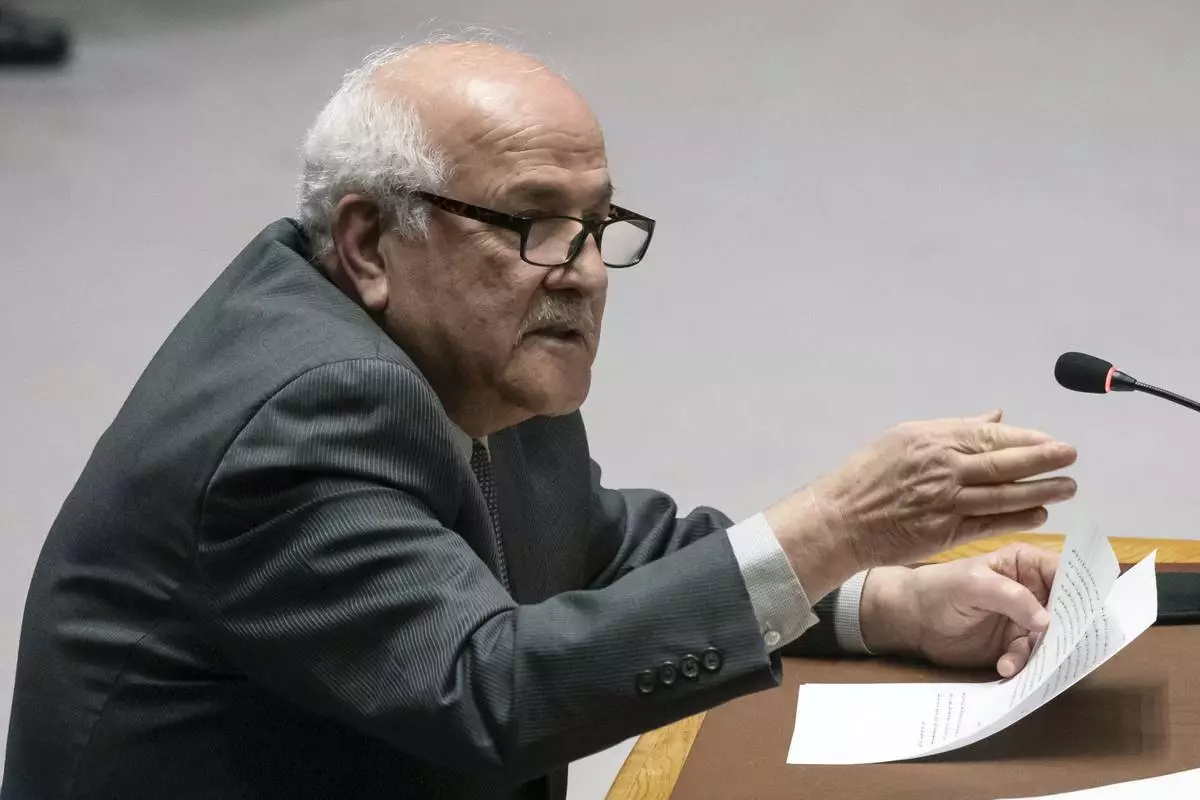
Palestinian Ambassador to the United Nations Riyad Mansour speaks during a Security Council meeting at United Nations headquarters, Thursday, April 18, 2024. (AP Photo/Yuki Iwamura)
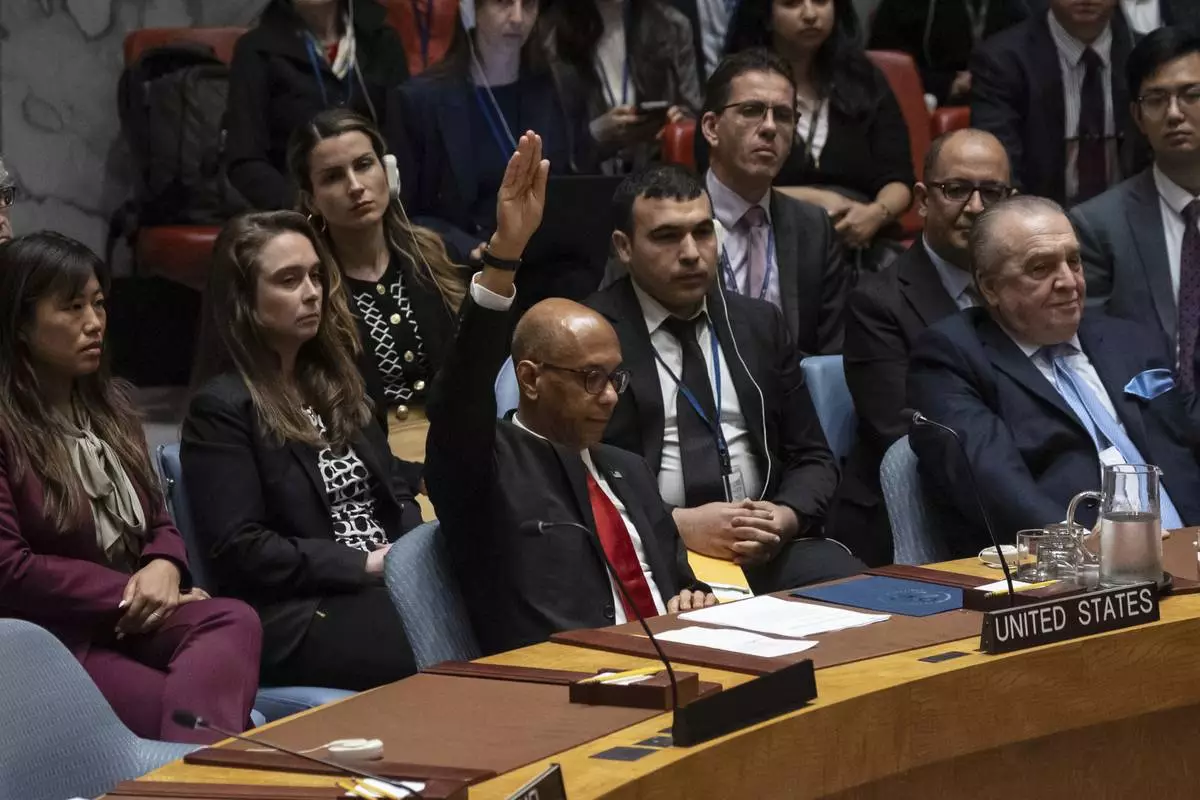
U.S. Deputy Ambassador Robert Wood votes against resolution during a Security Council meeting at United Nations headquarters, Thursday, April 18, 2024. (AP Photo/Yuki Iwamura)



















